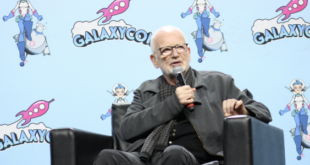Basil Rathbone, Christopher Plummer, Jeremy Brett and Robert Downy Jr. have each taken on Sherlock Holmes and brought something indefinable to it. Each actor has brought the same character to life and left his personal stamp on an iconic literary and pop culture figure. With each new interpretation, another layer has been added to the famous character’s mythos until one would think it impossible for anybody to bring something new to the role. At least that’s how I felt until I watched Benedict Cumberbatch as Sherlock Holmes in Sherlock: Season 2 currently airing on the Public Broadcasting System’s (PBS) program Mystery!
Although Episode One “A Scandal In Belgravia” aired May 6, if you missed it you can usually count on PBS rebroadcasting progams or you can wait for the DVD release on May 22 after the airing of Episode Two, “The Hound Of Baskervilles” (May 13) and Episode Three, “The Reichenbach Fall” (May 20), 9:00 p.m. on most PBS stations (check local listings). Those of you who saw Season One are already aware that while the titles are the same as the master detective’s great cases, there is one crucial difference. Instead of being set in Sir Arthur Conan Doyle’s 19th century England, these take place in modern times.
Sherlock and Dr. John Watson, Martin Freeman still live at 221B Baker Street; Mrs Hudson (Una Stubbs) is still their landlady, and Detective Inspector Lestrade (Rupert Graves) is still Sherlock’s pet police man at Scotland Yard. However instead of his trademark magnifying glass, our consulting detective carries a smart phone and uses computers and modern pathology equipment to break down the clues he finds at crime scenes. Oh, and Holmes still has the annoying habit of being able to observe everything that others miss, and has no problems pointing it out.
Now, thanks to press access I’ve seen all three of Season Two’s episodes, but don’t worry I’m not about to give away any details. However, if you know anything of the original stories you’ll have a fairly good idea how they play out anyway. For although the stories have been adapted to meet the 21st Century (in “The Hound Of Baskerville” there is a mysterious government facility named Baskerville where it’s rumoured they do genetic modifications to animals located right next to the moors where the hound is supposed to have been seen), they don’t diverge too far thematically. One thing that I will tell you is that its important to remember that lurking in the background of nearly every episode is Holmes’ unscrupulous counterpart, the consulting criminal, Jim Moriarty (Andrew Scott).
He appears at the beginning of Episode One to resolve the cliffhanger from the first season then vanishes from sight until the end of Episode Two, finally taking centre stage with Holmes in the seasons finale. All along we are made aware of the similarities between the two men. Each of them have superior intellects which they need to be employing or they become bored. The difference being while Holmes is willing to wait for puzzles to come along for him to solve, Moriarty is completely amoral and delights in creating the puzzles for Holmes no matter what the cost in human lives.
Ever since Moriarty discovered Holmes existed he’s been setting puzzles for him as a diversion and to gauge what kind of threat he poses. He could be two, even three steps removed from the actual crime, but if you dig deep enough you’ll find he’s had something to do with every case Holmes and Watson are involved in right from the onset of Season One. Does he merely enjoy the game, seeing Holmes respond to his moves and attempt to outwit him, or is there some other deeper, more sinister motive, driving him?
While the plots and the scripts are well developed and well written, what really matters in any telling of the adventures of Sherlock Holmes are the lead performances. As Holmes, Benedict Cumberbatch has to be seen to be believed. Even in repose, you have the impression of a coiled spring ready to explode at the first chance. While those around him think he enjoys making others look stupid with his powers of observation and intellect, if they were paying attention at all, they would realize he doesn’t care enough about what they think to bother wanting to show them up. He might get frustrated with their inability to draw the same conclusions he does from the evidence at hand, and often makes belittling comments about their abilities, but he’s so removed from the mundane world he can’t understand why people might be offended by his behaviour.
All that exists for him is the puzzle to be solved. He will literally skip for joy at the announcement of a particularly difficult murder enquiry, refers to serial killings as fun and has a nasty habit of making no secret about how much fun he’s having even thought lives are at stake. You would think he was selfish and conceited except for the fact in order to be those things you have to think the rest of the world matters, and he never gives the impression they do. Cumberbatch somehow manages to communicate all of this both with his physical characterization of Holmes and his delivery of the lines. There is something about the way he always holds himself which creates the impression all his energy is pointing inward. Even when he’s completely still we know there is incredible activity going on inside.
However, Cumberbatch doesn’t just play him as a feelingless robot. He clamps down hard upon his feelings as they are a distraction to his intellect. He lets us have occasional glimpses past the wall he’s erected around them, and those are enough for us to realize there is a human being beneath the surface. He might not need to give vent to the needless demonstrative displays so many in the world do, but that doesn’t mean he doesn’t care about those in his life as we find out as Season Two progresses. It’s these glimpses he offers us that make the loyalty offered him by Dr. John Watson believable.
Martin Freeman is the perfect Watson to Cumberbatch’s Holmes. Short and rather soft around the edges he offers a great physical contrast to Cumberbatch’s tall and sharp Holmes, but it’s not only their physicality that sets them apart. Watson wears his heart on his sleeve, cares about what others think of him, and, just as importantly, cares about what others think of Holmes. It’s wonderful watching the two of them in public situations with Watson serving as a buffer between Homes’ brutal honesty and people’s feelings. He doesn’t quite elbow his friend in the ribs, but his whispered asides of “Say thank you” or “Maybe you shouldn’t smile so much, two children have been kidnapped” serve the same function.
While Freeman frequently allows Watson’s exasperation with his friend’s behaviour to show through, he also makes it plain he’s also having the time of this life being involved with the cases Holmes takes on. Like Holmes, it’s not because of the attention they start to receive for solving the cases (in fact he could do without people jumping to conclusions about two single men living together); Watson, too, enjoys the thrill of the chase and the adventure. Although both he and we might occasionally wonder why Holmes involves him in his cases, there is obviously something about Watson he finds invaluable. While he’s just as impatient with Watson as witheveryone else, he also seems to appreciate somebody to whom he can talk out loud, and, more importantly, trust. It’s a complicated relationship and one that both actors do a remarkable job of making very real and believable.
There have been many film and television adaptations of Sir Arthur Conan Doyle’s enigmatic hero Sherlock Holmes, but the one being broadcast on the PBS show Mystery over the next couple weeks of 2012 May has to rank up there with the best. The scripts are well written and the acting is of the highest quality. However, the performances of Benedict Cumberbatch and Martim Freeman as Holmes and Watson respectively are what make Sherlock: Season Two probably the best thing currently on television. In the words of one character, “smart is the new sexy” and this is the smartest thing you’ll have seen in a long time.
 Blogcritics The critical lens on today's culture & entertainment
Blogcritics The critical lens on today's culture & entertainment



